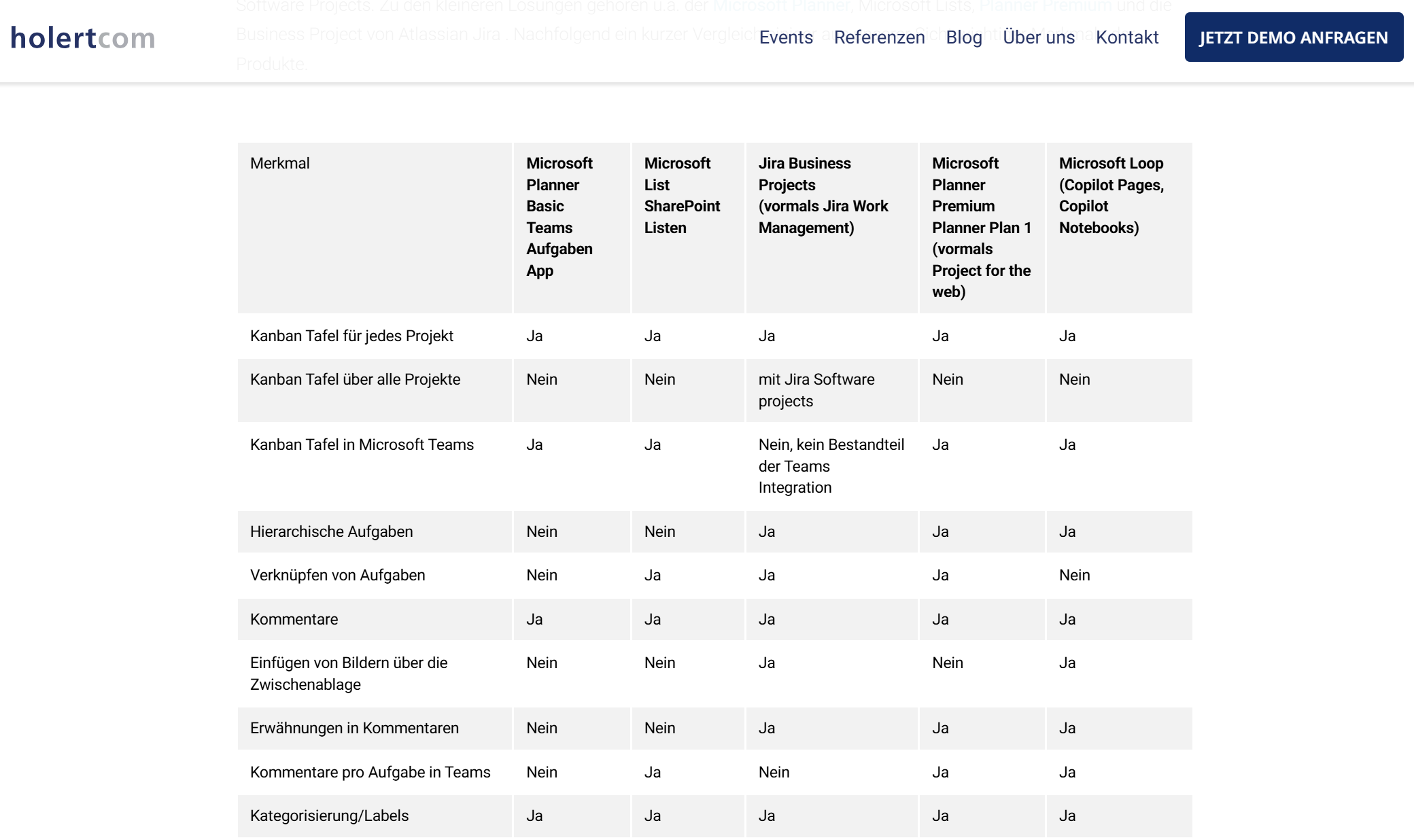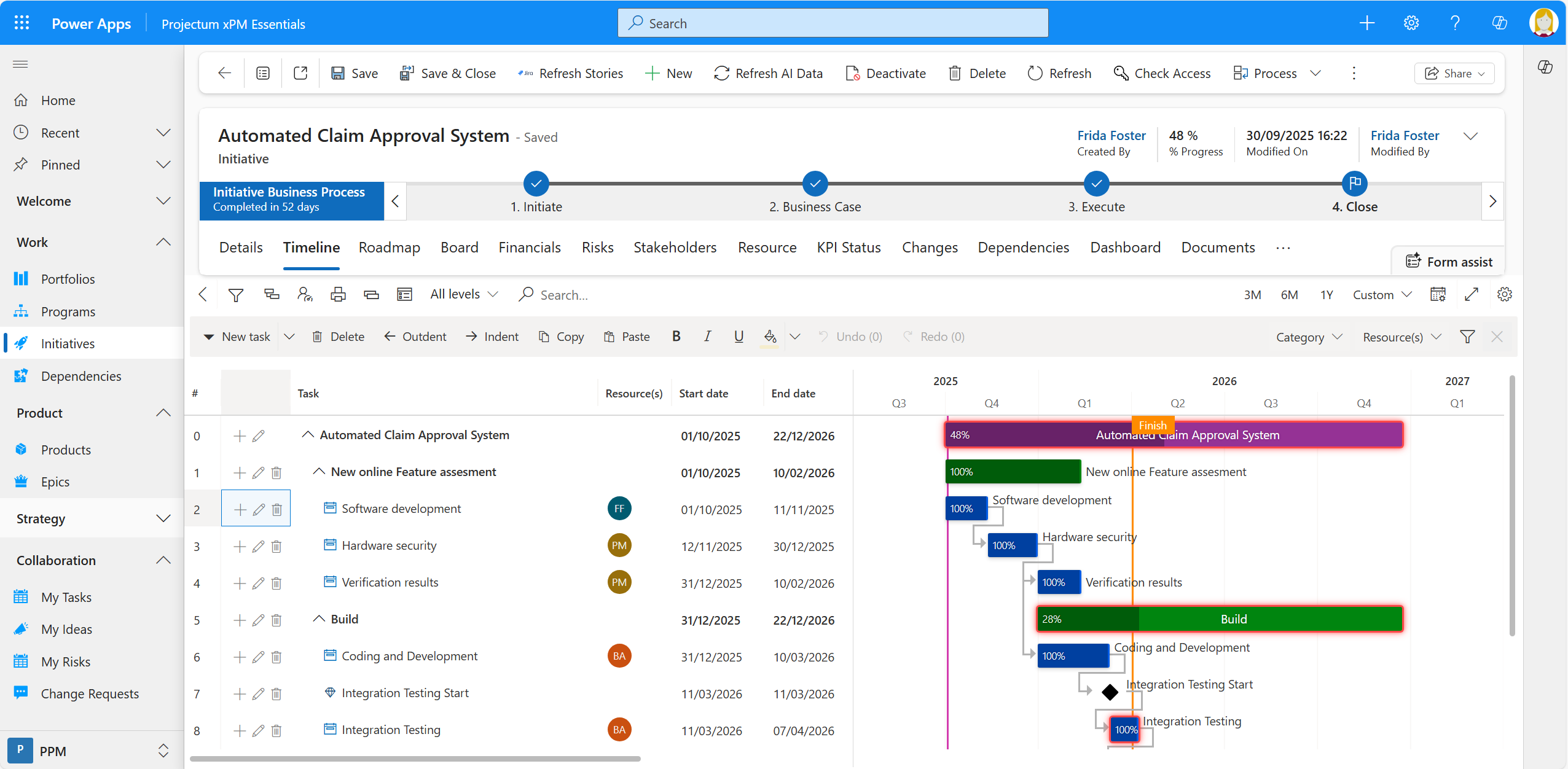Microsoft is discontinuing Project Online - what are the best alternatives?
Microsoft has officially announced: Microsoft Project Online will be shut down on September 30, 2026. Companies that have been using Project Online...
14 min read
 Renke Holert
Sep 13, 2025 8:11:17 AM
Renke Holert
Sep 13, 2025 8:11:17 AM

Microsoft has officially announced: Microsoft Project Online will be shut down on September 30, 2026. Companies that have been using Project Online up to now should look into alternatives and migration strategies at an early stage. We answer frequently asked questions and show why we think this is a positive development overall.
Project Online will no longer be availablefrom 30.09.2026.
Microsoft Project Server Subscription Edition will remain available.
The Microsoft Project Desktop App will remain available.
Microsoft has been offering more modern apps for the management of projects and agile software development for some time now, namely Planner, Loop, Azure DevOps and Dynamics 365 Project Operations.

There are two products behind Microsoft Planner: Planner Premium (originally Microsoft Project for the web) and Planner Basic (originally Planner). The Planner Premium plans use the logic of Microsoft Project internally and come closest to it. Basic plans are particularly suitable for managing a simple Kanban board.
A new addition is Microsoft Loop, which is partially integrated into Planner and To Do for task management and is essentially a kind of wiki that also forms the basis for Copilot Pages.
Microsoft Azure DevOps and Azure Boards also offer functions that are particularly suitable for agile product development.
And finally, there is Microsoft Dynamics 365 Project Operations, Microsoft's solution for large professional service organizations.
What all these solutions lack, however, is the ability to manage projects and products across the organization, e.g. for requirements management, scenario planning, portfolio management, program management, simple overarching resource management and also the ability to integrate apps with each other and with products from other manufacturers, such as Atlassian Jira.
The gap is filled by more powerful next-gen PPM solutions based on the Microsoft Power Platform, such as Projectum xPM and Altus.
The shutdown of Project Online is a challenge - but also an opportunity. Companies can use the change to modernize their project landscape and introduce more powerful next-gen PPM solutions. These solutions offer many advantages over Project Online:
They support the processes of requirements management, scenario planning, portfolio management, program management, resource management, agile product management and time tracking and have a more powerful reporting system. They only supplement what Microsoft itself does not offer and make ideal use of Microsoft 365, e.g. Microsoft Teams, Power BI and Power Apps. Thanks to Microsoft's Copilot AI, these solutions are perfectly geared towards the future. They also integrate Planner Basic and Premium as well as Azure DevOps and Atlassian Jira.
Basically, as a user, you have a wide range of project management solutions to choose from.
The market for project and portfolio management software can be roughly divided into two categories: standalone SaaS solutions and solutions based on no-code or low-code platforms. Standalone SaaS products are usually ready to use quickly, but often have the disadvantage that they duplicate functions that are already available in a Microsoft 365 environment - such as the chat function of Microsoft Teams or reporting with Power BI.
In addition, the IT department has to check each additional solution individually for data security and, if necessary, establish new processes for operation and integration. Furthermore, these systems can usually only be adapted within the scope of the intended configuration options - flexible expansion is not usually provided for.
In contrast, project and portfolio management software based on no-code/low-code platforms that do not originate from Microsoft already offer a freer extension. For organizations that already use Microsoft 365, however, these solutions also have the disadvantage that many functions are redundant to those of Microsoft. In addition, they do not benefit from Power Apps, one of the best platforms in this area, and there is the added expense of data security, operation and integration. For this reason, we recommend Projectum xPM and Altus. Both solutions integrate Microsoft Project or Project Online, which means that the effort required for migration is very low.
Both Projectum xPM and Altus or the organization behind it, Sensei, are companies that have implemented PPM solutions based on Microsoft technologies for decades. Both have had established PPM solutions on the market for many years, which are used by many satisfied customers internationally and in German-speaking countries. The two leading global solutions differ in their profile. Depending on the respective application, one or the other is more suitable. Both are genuine standard products that are regularly updated by the manufacturer.
They support processes such as requirements management, scenario planning, portfolio management, program management, resource management, agile product management, time recording, can historicize all data and have a more powerful reporting system. They only supplement what Microsoft itself does not offer and make ideal use of Microsoft 365, e.g. Microsoft Teams, Power BI and Power Apps. Thanks to Microsoft's Copilot AI, these solutions are perfectly geared towards the future. They also integrate Project Online during the coexistence phase, the MS Project Desktop Client, Planner Basic and Premium as well as Azure DevOps and Atlassian Jira.
This makes them fundamentally different from many other solutions, especially in the German-speaking market, which are more like individual software that the customer has to maintain and service as part of consulting projects.
Would you like an overview of the differences between the two solutions? Then please contact us.

Holert has been implementing Microsoft-based project and portfolio management solutions as well as agile product development solutions for over 20 years. With a team of over 35 employees, Holert started over five years ago to prepare existing customers for the time after Project Online and to migrate to the modern next-gen solutions Altus (formerly known as Sensei IQ) and Projectum xPM (formerly known as Projectum Power PPM). Holert's in-depth knowledge of Project Online will greatly facilitate the transition. Only Holert has experience in migrating and implementing Altus and Projectum xPM in German-speaking countries, including KPT, Rohde & Schwarz, KUKA, Amer Sports, KWS, LAPP, Stadtreinigung Hamburg, Accompio, Frischli, Swoboda and SteelcoBelimed(Miele). As Holert is not the manufacturer, but an implementation partner, we can provide neutral advice. We also have a strong specialization in Atlassian products, including Jira and Rovo.
Further references can be found here: Holert project management and portfolio management references
Access to Project Online data will be discontinued from September 30, 2026. This leaves only limited time for an orderly migration. Such projects require far more than just technical adjustments: Change management, training and the introduction of new processes are also necessary. Starting early reduces risks and ensures a smooth transition.
If you would like to discuss now what the imminent end of Project Online means for your organization and what migration paths could look like, please contact us or make an appointment with us directly.

In order to find the best approach and target solution for your organization to replace Project Online, Holert has the following offers:
To get an overview of the new solutions, feel free to watch the recordings of our previous events with VOLVO, KPT, Rohde & Schwarz and Miele and meet us at the following events:
Follow us on LinkedIn, where we will be publishing more about the end of Project Online and tips & tricks for improving the effectiveness of your PMO in the near future.
If you would like to discuss now what the upcoming end of Project Online means for your organization, please contact us or make an appointment directly with us.
Microsoft announced one day in advance for partners on September 5, 2025 that Project Online will be shut down on September 30, 2026: Microsoft Project Online is retiring: What you need to know
Project Online will be shut down for good on September 30, 2026. New licenses (SKUs) for Project Online will no longer be available from October 1, 2025.
Yes, existing customers can continue to use Microsoft Project Online in full until the end of September 2026. Projects, data and integrations will remain active until then.
Project Online is based on outdated architecture that prevents innovation - such as integration with modern tools like the Power Platform or Microsoft 365 Copilot. Microsoft is therefore investing in a new generation of intuitive, scalable work management solutions such as Microsoft Planner.
The data on the SharePoint sites of Project Online, such as risks, issues or documents, are also affected by the shutdown. Microsoft offers free migration tools for this. We would also be happy to support you here with a migration to the Power Platform or for the documents to modern SharePoint sites. Our Power Apps-based solutions Altus and Projectum xPM also offer SharePoint/Teams integration.
Altus PPM and Projectum xPM in particular come from two internationally renowned manufacturers who were former implementation partners of Microsoft Project Online. Both have developed internationally leading next-gen project and portfolio management solutions that make the transition from Project Online and Project Server easy - both through a one-off migration and through synchronization during a transition period. In addition, the Microsoft Project desktop app can continue to be used for a transitional period or permanently, making the transition much easier for project managers.
If you would like to discuss now what the upcoming end of Project Online means for your organization and what migration paths could look like, please contact us or arrange an appointment directly with us.

In this blog article, we have compared some of the features of both Planner Basic and Planner Premium plans: Comparison of Microsoft Planner, SharePoint Lists, Planner Premium, Loop and Jira Business Projects

As an alternative to Planner Premium, the Project Online alternative Altus comes with its own scheduling and resource planning function and teams can flexibly decide whether they want to work with the Altus Scheduler, Planner, Planner Premium processes and/or with Azure DevOps and Jira.

Projectum xPM brings a powerful scheduler that uniquely supports integration with Jira and Azure DevOps in both Roadmap and Gantt view. Both the Altus Scheduler and the Project xPM Scheduler support Gantt and Kanban visualization.
If you would like a detailed comparison between Planner Premium and Microsoft Project Online, please contact us.
Yes, firstly, the Microsoft Project Desktop app is not affected by the discontinuation of the online service and will continue to be maintained and updated by Microsoft. The desktop app, or rather "MS Project", is synonymous with project management software. There is hardly any software that does not have an interface to MS Project. There are many people who are familiar with the desktop app and appreciate the Excel-like operation, which no web application offers in this form.
You can therefore continue to use Microsoft Project, but you can no longer save the data directly in Project Online. Alternatively, the project plans can be saved in the file system and stored in the Microsoft Cloud via Allocatus, for example, so that the tasks from MS Project can be transferred to the employees' Outlook calendars and the actual Gantt chart can be shared with the team via the web interface, e.g. in Microsoft Teams.

You can also use Holert Project2Planner to send tasks from MS Project to Microsoft Planner so that your team can conveniently see all the tasks you have assigned to them in Microsoft Project in the Planner app and, if necessary, in Microsoft Teams and Microsoft To Do.

Alternatively, you can also save Microsoft Project projects directly in Altus and Projectum xPM in Microsoft 365 (Dataverse). Only with these solutions can you continue to store all data centrally and work with it permanently or during a transition period. Other cloud solutions offer a one-off import, if at all. This can make the transition much easier, especially for current Project Online users.
If you would like to discuss what the imminent end of Project Online means for your organization and what migration paths could look like, please contact us with us directly.
No, Microsoft Project Server Subscription Edition (SE) is just as little affected by the shutdown as SharePoint Server Subscription Edition and remains in active maintenance. Project Server Subscription Edition follows the Modern Lifecycle Policy, which means that Microsoft announces the end of maintenance at least 12 months in advance. However, end of maintenance also means that you can use the software beyond this date.
These are technically two different technologies. As far as we currently know, Project Online data can be exported via interfaces; our next-gen PPM solutions Altus and Projectum xPM can import the data directly. The Microsoft Project Accelerator is based on Project for the web (now Planner Premium). This data will be retained and will not be affected by the shutdown of Project Online.
Yes, you can continue to use the Microsoft Project Desktop app as a project manager with both the next-gen project and portfolio management apps Altus and Projectum xPM. However, the data is not stored in Project Online, but in Dataverse, i.e. Microsoft's modern Power Platform.
Based on the solutions from the manufacturers Altus and Projectum, Holert offers extended migration routines specially adapted for the DACH region, with which you can already see your data in the new solution during test operation.
You can find a brief overview of the solutions here: Project management with Microsoft and Atlassian
Take a look at the recordings of our previous events or meet us at one of our future events: PMO/VMO and project management events
Visit the websites of the vendors: Altus and Context& (Projectum)
In addition to Planner, Loop and Project Operations, the project and portfolio management solutions from Altus and Projectum keep their data exclusively in the customer's tenant.
Altus and Projectum xPM have attractive license prices. Because the software is highly standardized, it already comes with best practices. For example, typical project types are already created, the project profile is preconfigured for each, suitable Power BI reports are supplied and interfaces are included for Planner, Project, Project Online, Jira, Azure DevOps, Teams, Word and PowerPoint, for example. There is also accompanying documentation and online resources. As Holert, we also already have a great deal of experience in integrating other systems such as SAP. In combination with the fact that the entire solution is based on the Power Platform, we can often make specific adjustments with just a few clicks. If desired, we can also enable the customer to do this themselves. The customer can often go live with the new system in just a few days or weeks. You can see for yourself by allowing us to provide you with a free trial version in your tenant.
Every organization has more ideas and implementation proposals than resources to implement them. Altus and Projectum xPM help to select the strategically right ones and implement them faster. The result is greater success and more satisfied customers and employees.
That depends somewhat on the status quo. In any case, the associated process and goal must be clearly defined for the respective expansion stage and lived by the relevant function holders. The software itself then helps to ensure that these can be implemented with less effort, faster and with better results, which accelerates success and benefits.
Yes, both Altus and Projectum xPM are based on the Microsoft Power Platform, which is available worldwide and supports all major languages.
To effectively implement a PPM solution at your organization, we need to identify the key bottleneck to be solved in the first step, as well as a shared vision of what a complete implementation looks like. Typically, we work on these topics in a joint workshop. After this workshop, you will have a precise roadmap, know the costs and the time requirements
Only Altus and Projectum xPM are standard software that keeps your data in your Microsoft 365 and cover the entire range of functions of an idea, proposal, portfolio, project, product and resource management app. They are also unique on the Microsoft platform in that they offer scenario planning with costs and resources. In addition, both are based on the Power Platform, which allows very simple and comprehensive customization and expansion.
Altus is also unique in that it integrates Planner Basic, Planner Premium, Microsoft Project Online, Microsoft Project Desktop, Jira and Azure DevOps plans as standard without any further programming. This solution also keeps your data exclusively in Dataverse, so no additional components need to be installed.
Projectum xPM is unique in that it is designed as a universal portfolio management solution and offers comprehensive product management with roadmap planning. It also comes with a data warehouse as standard, which allows the historization of all data, including recovery, even beyond thirty days.
We will be happy to provide you with a quote. Please contact us or make an appointment with us directly.
Both Projectum xPM and Altus come fully configured, including a large number of reports. Both solutions cover best practices and can be used immediately. The installation of a typical test environment takes about 3 hours, after which you can get started immediately and test the environment in your Microsoft 365 environment (tenant)
Yes, because the Projectum xPM and Altus solutions are genuine standard software that is already being used by the manufacturers for over 400 customers and we have already implemented them for many customers in German-speaking countries, we can offer you very attractive implementation packages. Either on a time and material basis or at a fixed price.
Yes, the special thing about Projectum xPM and Altus is that they are based on the Microsoft Power platform. On this platform, you can customize fields and forms, add new tables, define workflows and much more with a simple click, i.e. without programming. The special thing about Projectum xPM is that you can also use the Gantt charts, roadmaps, Kanban boards
The Project Online alternatives Projectum xPM and Altus both come with a variety of ready-made Power BI reports. You can use these immediately. You get access to the original files and can customize them according to your requirements. Altus supports authorizations in reports by default, so that users only see in the reports what they see in Altus according to their authorization. Projectum xPM comes with a data warehouse as standard, which historicizes all data and can also restore it at any time if required.
Altus comes with predefined workflows, including for the project life cycle and the requirements and selection process, which can be adapted with just a few clicks without programming. Projectum and Holert also provide additional templates that you can also use and easily customize.
Resource management takes place at different levels in both solutions, once at project level and once at task level. In both solutions, you can already determine the resource requirements for each project or project application, e.g. broken down by qualification, department, location. You can also estimate the effort required for each task and have this effort automatically aggregated at project level if necessary. Holert's AI functions can also make this process easier.
Resource requests can then be very easily transmitted at project level to the team leaders, who can then assign suitable resources with just a few clicks of the mouse and adjust the deployment if necessary. Here too, the software makes work much easier.
In German-speaking countries, Holert has already implemented both solutions for many customers and replaced Project Online. These include KPT, Rohde & Schwarz, KUKA, Amer Sports, KWS, LAPP, Stadtreinigung Hamburg, Accompio, Frischli, Swoboda and SteelcoBelimed (Miele). A complete overview including video reviews and recordings of customer presentations can be found here: References
In addition to Planner, we also use Jira and Altus. Which app is best suited for which type of project?
Microsoft Planner Basic Plans is suitable for smaller projects where a list of open tasks is processed successively.
For larger projects that require structured scheduling, Planner Premium Plans are the preferred choice. These plans enable you to calculate tasks logically based on their dependencies. In addition to timeline management, Planner Premium also allows you to allocate and monitor the workload of each team member for every task.
Jira Software Projects are designed for software development projects. Jira offers, among other things, a hierarchical structure of tasks, e.g. according to epics and stories, and the organization of work via Kanban boards.
Altus is suitable for gaining a complete overview of all projects and resources. Altus integrates all of the aforementioned project management apps and adds more project details for each project, including resource and financial requirements.

In Planner Basic Plans, you can organize tasks according to progress or other criteria (buckets).

Planner Premium adds a schedule in which you can organize tasks in a logical order. You can also plan the effort required for each task per employee.

With Jira Software Projects, the entire work can be structured in the backlog and managed in a Board view according to the planning logic.

Altus provides a complete overview of all projects, regardless of which software they are managed in.

It adds, depending on the size of project, more details, like the project charter,

resource demand, financial requirements, stakeholders, risks and much more.

Altus also supports the project selection and cross-project resource and financial planning.

Microsoft has officially announced: Microsoft Project Online will be shut down on September 30, 2026. Companies that have been using Project Online...